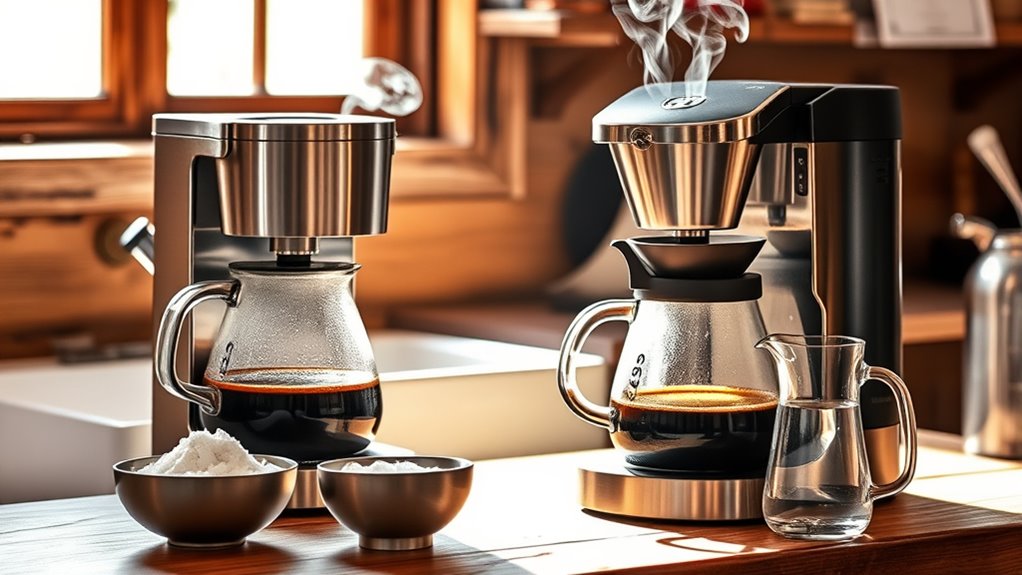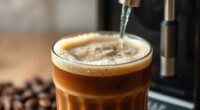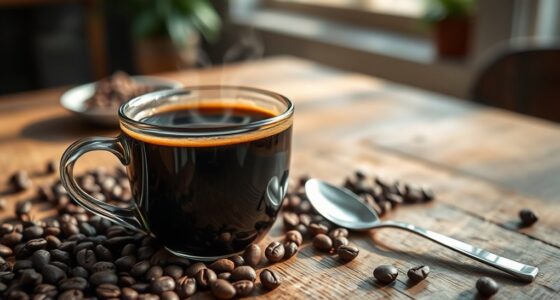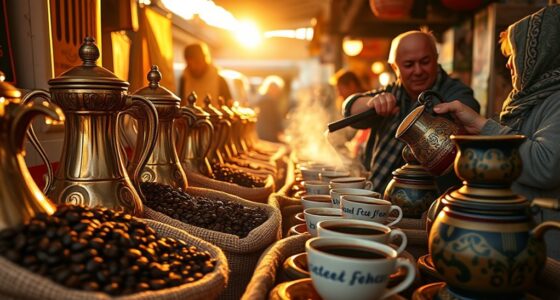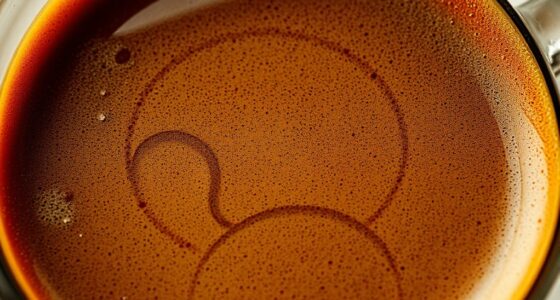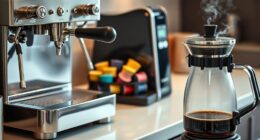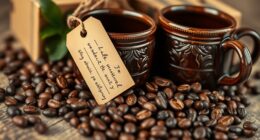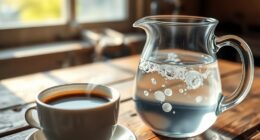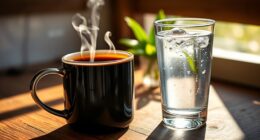Brewing coffee in hard water? You’ll want to adjust your techniques for the best flavor. Start by using filtered or bottled water to reduce bitterness and improve taste. Keep your water temperature between 195°F and 200°F, and experiment with shorter brewing times. Tweaking your coffee-to-water ratio can make a big difference, too. Remember to regularly clean and maintain your brewing equipment. There’s more to explore about overcoming hard water effects for a delicious cup.
Key Takeaways
- Use filtered or bottled water to reduce chlorine and excess minerals, enhancing coffee flavor and extraction.
- Adjust brewing temperature to 195°F to 200°F to prevent bitterness from hard water.
- Experiment with a higher coffee-to-water ratio (1:15 to 1:17) to improve flavor balance and reduce bitterness.
- Pre-wet coffee grounds before brewing to help mitigate bitterness caused by hard water.
- Regularly descale your coffee maker to prevent mineral buildup and maintain optimal brewing conditions.
Understanding Hard Water and Its Effects on Coffee Flavor
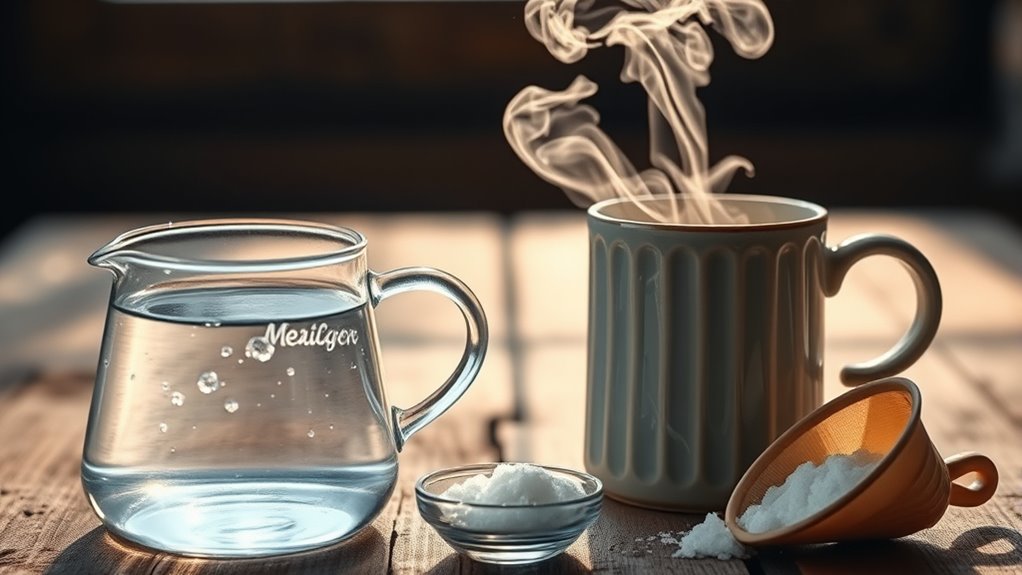
Hard water can greatly impact your coffee experience. When brewing coffee with hard water, the high levels of calcium, magnesium, and bicarbonate can alter your coffee taste.
These minerals affect the extraction process; while they may enhance certain flavor notes, they can also mask acidity and emphasize bitterness, leading to a cup that tastes flat or dull.
Excess bicarbonate balances the pH, complicating flavor perception. Additionally, water hardness varies by local water source, which means you might need to adjust your brewing techniques based on the mineral content.
If you’re not careful, the stronger caffeine extraction from hard water can leave you with an overly bitter brew. Understanding these effects helps you improve your coffee experience.
Identifying the Quality of Your Water Source
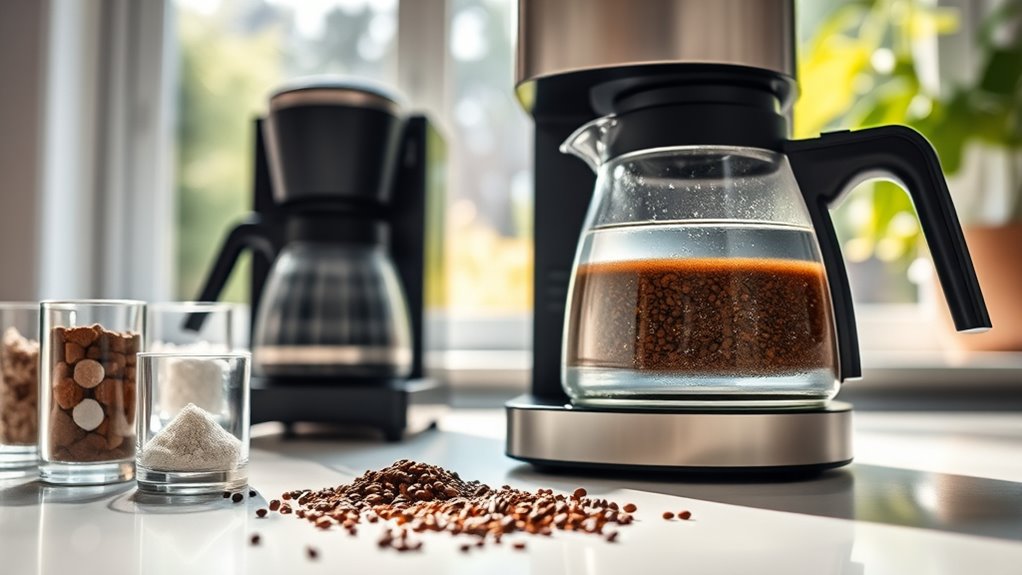
Before you brew your next cup, it’s essential to identify the quality of your water source, as this can greatly affect your coffee’s flavor.
Start by checking your local water quality report online, searching for “[CITY, STATE] Water Report.” Focus on parameters like total hardness, ideally between 50 to 175 ppm, and carbonate hardness, recommended at 40 to 75 ppm.
Hard water often contains high levels of calcium and magnesium, which can lead to bitterness and affect flavor extraction during the brewing process.
Additionally, keep an eye out for contaminants like chlorine and heavy metals; even low levels can alter how your coffee tastes.
If your local reports indicate poor water quality, consider using filtered or bottled water for the best results.
Techniques for Adjusting Brewing Time and Temperature
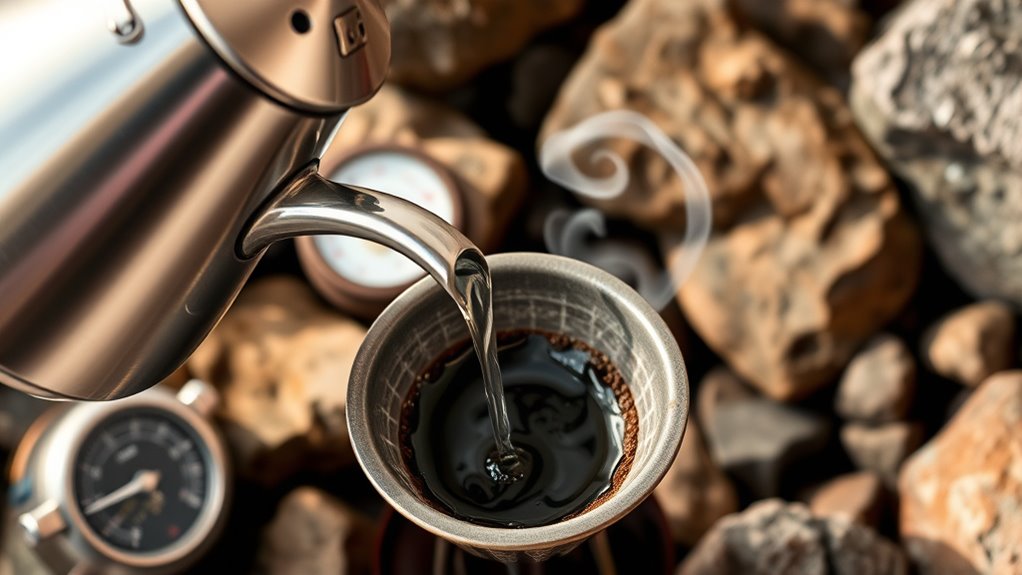
When brewing coffee with hard water, you’ll want to carefully adjust both the temperature and time for the best flavor.
Keeping your water between 195°F and 200°F helps prevent bitterness, while shorter brewing times can also reduce over-extraction.
Experimenting with these parameters can lead to a more enjoyable cup, so don’t hesitate to make adjustments based on your water’s mineral content.
Optimal Brewing Temperature Range
The ideal brewing temperature for coffee ranges from 195°F to 205°F (90°C to 96°C), making it essential to control this variable, especially with hard water.
Achieving the best brewing temperature helps guarantee proper extraction of flavor compounds, which can be tricky with hard water’s higher buffering capacity. Brewing at lower temperatures can lead to weak or oily coffee, while excessive heat may cause over-extraction and bitterness.
A temperature-controlled kettle is invaluable for maintaining this range, allowing you to make precise adjustments. Keep an eye on the brew temperature to enhance the extraction process.
Adjusting Brewing Time Techniques
Adjusting brewing time is essential for achieving the perfect cup of coffee, especially when dealing with hard water. To enhance flavor extraction, consider extending your brewing time, allowing the coffee grounds to interact longer with the water.
Keep an eye on the brewing temperature; aim for 195°F to 205°F to prevent over-extraction of bitter compounds. Experiment with a coarser grind size to increase brewing time without drawing out undesirable flavors.
Adjust your coffee-to-water ratio, using slightly more coffee—about 1:15 to 1:17—to boost flavor extraction. Regularly taste your brew and fine-tune your brewing parameters, as the effects of hard water can vary, leading to a more balanced and delightful coffee experience.
Cleaning and Maintaining Your Brewing Equipment
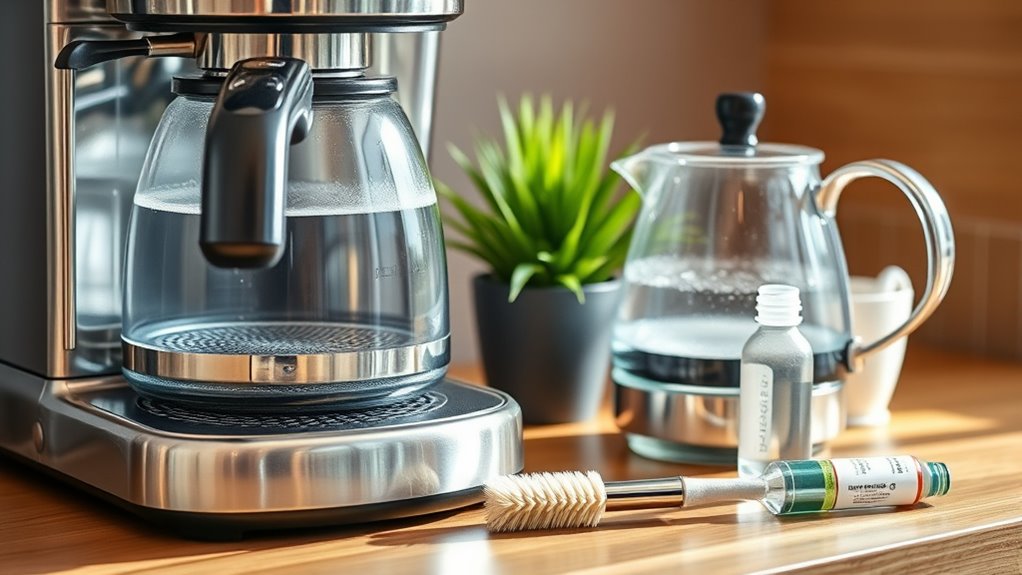
To keep your coffee brewing equipment in top shape, establish a regular descaling routine to combat mineral buildup from hard water.
Properly store your equipment when not in use, ensuring it’s clean and dry to prevent any unwanted odors or flavors.
Taking these steps will help enhance both the longevity of your machine and the quality of your coffee.
Regular Descaling Routine
While brewing coffee with hard water can enhance certain flavors, neglecting regular descaling can lead to mineral buildup that compromises both taste and your machine’s lifespan.
The Specialty Coffee Association advises you to descale your coffee maker every 1-3 months, depending on your water’s hardness and how often you use it.
To effectively remove mineral buildup, use a descaling solution specifically designed for coffee machines. If you prefer a natural alternative, a mixture of equal parts vinegar and water can work, though it may be less effective.
After descaling, always run several cycles of clean water through your machine to eliminate any residual cleaning solution, ensuring your next brew remains pure and flavorful.
Check your manual for specific instructions based on local water quality.
Proper Equipment Storage
After you’ve established a regular descaling routine, proper storage of your brewing equipment becomes essential to maintaining its performance and the quality of your coffee.
If you’re using hard water at home, it’s even more vital to keep your coffee machines in top shape. Here are some tips for proper equipment storage:
- Store in a dry, clean area to prevent moisture and contamination.
- Rinse thoroughly after cleaning to avoid any residual cleaning agents that can affect flavor. Maintaining cleanliness in your kitchen promotes a healthier lifestyle.
- Regularly clean coffee grinders to eliminate oils and particles that can decrease freshness.
- Ensure proper airflow around the unit to prevent any mold or mildew buildup in your coffee equipment.
Adjusting Coffee-to-Water Ratios for Optimal Taste
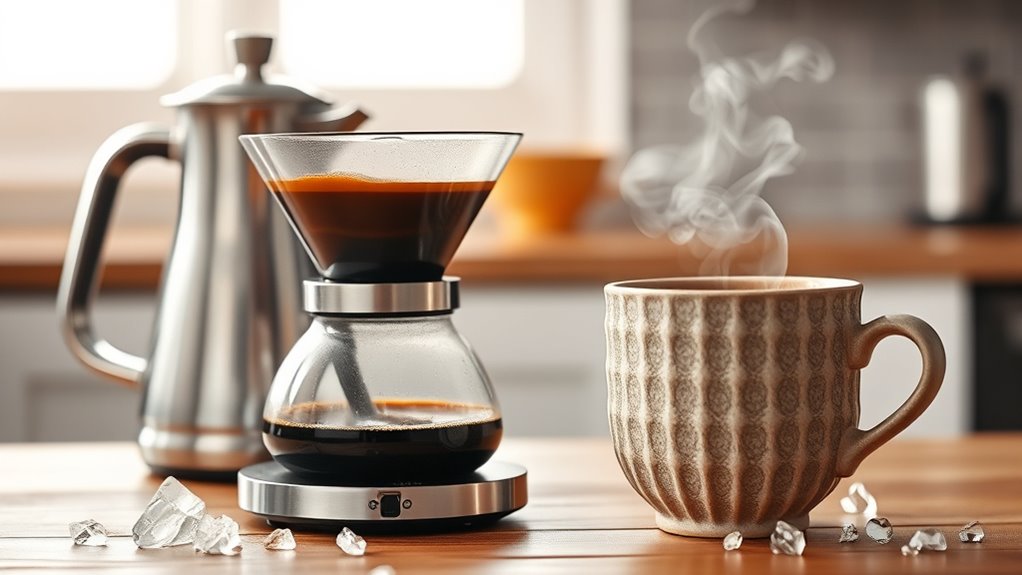
Adjusting the coffee-to-water ratio can greatly enhance your brewing experience, especially when dealing with hard water.
To compensate for potential bitterness and improve flavor extraction, aim for a coffee-to-water ratio of 1:15 or 1:16. Start by adding an extra 1-2 grams of coffee per 200 grams of water to achieve ideal taste.
Don’t forget to adjust your brewing time; steeping for 4 to 6 minutes can help extract the desired flavors. Pay attention to how your specific coffee beans respond, as lighter roasts may need less coffee than darker roasts.
Finally, regularly conduct a taste test to fine-tune your ratio, ensuring you get the best flavor profile possible despite hard water’s challenges.
The Benefits of Using Filtered or Bottled Water
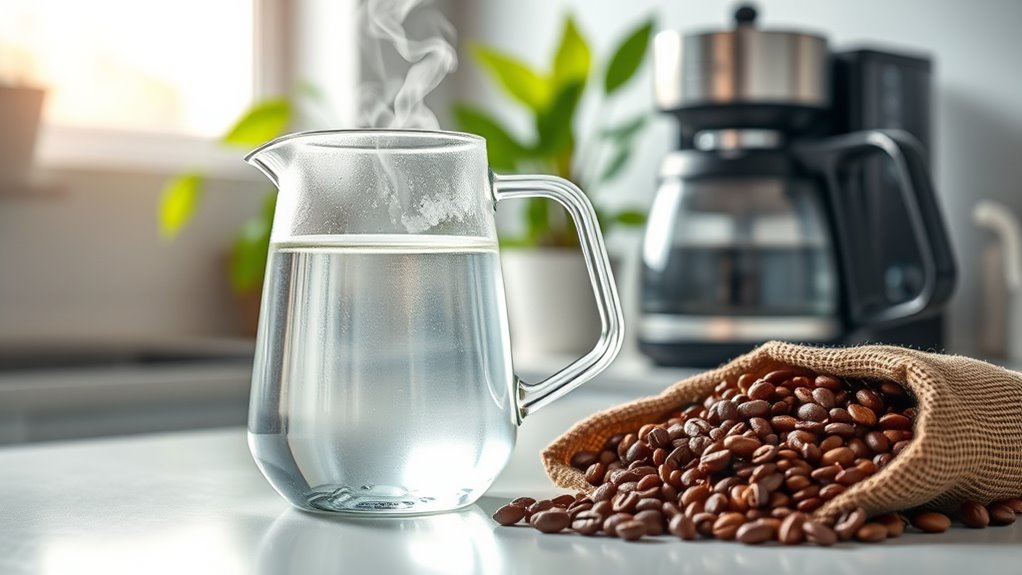
Using filtered or bottled water can dramatically enhance your coffee experience, especially when grappling with the challenges of hard water.
Here are some key benefits:
- Improved Flavor: Filtered water removes chlorine and excess minerals, reducing bitterness and enhancing taste. Additionally, using juice extraction techniques can help you understand the importance of maximizing natural flavors in beverages. Furthermore, employing HEPA filters in your home can improve overall air quality, which indirectly influences your sensory perception of coffee. Freshly squeezed juices, like orange juice, are often noted for their vibrant flavors, similar to how filtered water can elevate coffee.
- Balanced Minerals: Bottled spring water often meets the Specialty Coffee Association’s recommended total dissolved solids (TDS) of around 150ppm, perfect for ideal extraction. Additionally, using filtered water can help minimize any potential negative effects on your coffee’s flavor profile.
- Reduced Maintenance: Using filtered water helps prevent mineral buildup in your coffee maker, extending its lifespan and decreasing the need for descaling. Additionally, understanding the mechanics of French press brewing can further improve your overall coffee quality. Regular maintenance of your coffee maker is crucial, much like the importance of monitoring fresh juice shelf life to ensure optimal flavor and freshness.
Experimenting With Different Brewing Methods for Hard Water
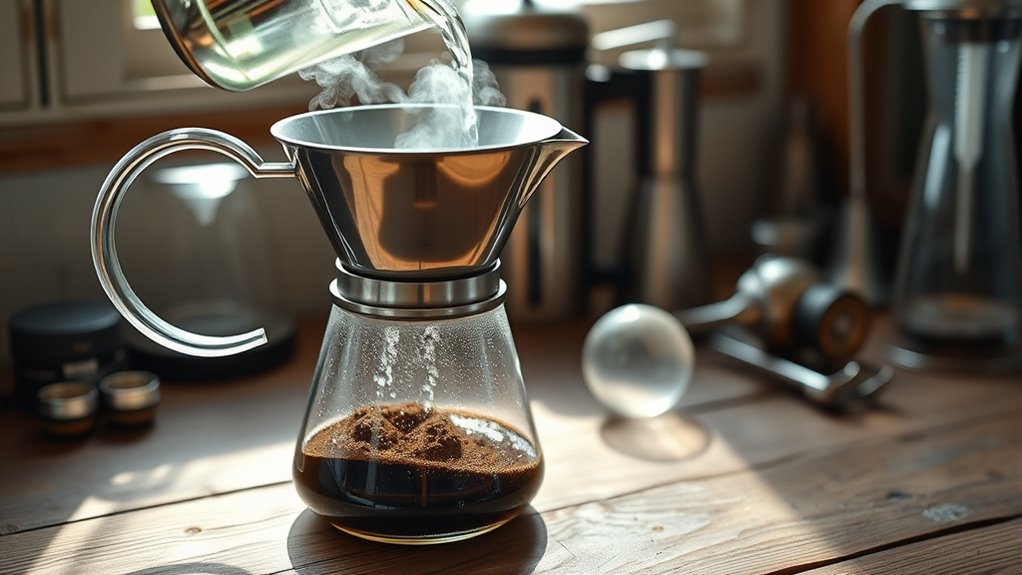
How can you make the most of hard water when brewing coffee? Start by experimenting with lower water temperatures, around 195°F to 200°F. This helps mitigate bitterness, resulting in a smoother cup.
Adjust your coffee-to-water ratio—using slightly more coffee can balance the flavor and enhance your brew.
Using a higher coffee-to-water ratio can enhance flavor and create a more balanced brew.
Try blooming techniques, pre-wetting coffee grounds before full brewing, to improve flavor extraction and reduce bitterness from hard water.
You might also consider adding a pinch of baking soda to increase bicarbonate levels, which can help balance acidity.
If you’re looking for more consistent results, think about using bottled water with lower hardness or mixing distilled water with specific minerals. This can elevate the overall experience of your coffee.
Frequently Asked Questions
How to Deal With Hard Water for Coffee?
Dealing with hard water for coffee can be challenging, but you’ve got options.
Start by using a water filter to reduce calcium and magnesium levels, which can improve flavor. You might also consider mixing distilled water with minerals to enhance extraction.
Regularly descaling your coffee equipment is essential to prevent buildup.
Finally, adjust your coffee-to-water ratio and experiment with lower brewing temperatures to balance bitterness and acidity in your brew.
Is Hard Water Bad for a Coffee Maker?
You know the saying, “A stitch in time saves nine”? That definitely applies here!
Hard water can be bad for your coffee maker. It leads to mineral buildup, which clogs your machine and reduces its lifespan. Plus, it can alter the flavor of your coffee, making it taste bitter.
To keep your coffee maker running smoothly, you’ll need to descale it regularly and possibly consider using filtered water for the best results.
Is Hard Water Bad for Brewing?
Yes, hard water can be bad for brewing coffee. It often leads to mineral buildup in your coffee maker, affecting its performance and lifespan.
While some minerals can enhance extraction, too much calcium and magnesium may result in a bitter taste and mask the coffee’s natural brightness.
Managing the hardness level is essential; otherwise, you could end up with heavy, undesirable flavors.
Regular maintenance helps guarantee you brew the best cup possible.
How Do I Convert Hard Water to Soft Water?
To convert hard water to soft water, you’ve got options.
Imagine the difference between gritty sand and smooth silk. You can use a water softener that swaps calcium for sodium, or install a reverse osmosis system to filter out those pesky minerals.
Mixing hard water with distilled water creates a gentler blend, too. Whichever method you choose, regular testing guarantees your water’s softness meets your needs for that perfect brew.
Conclusion
In the end, brewing coffee in hard water doesn’t have to be a struggle. With a few adjustments to your technique and water quality, you can access a world of flavor that rivals the best cafés. Imagine savoring that perfect cup, rich and smooth, every morning. So, why settle for less? Immerse yourself in the world of coffee with confidence, experiment a little, and discover how great your daily brew can truly be!
